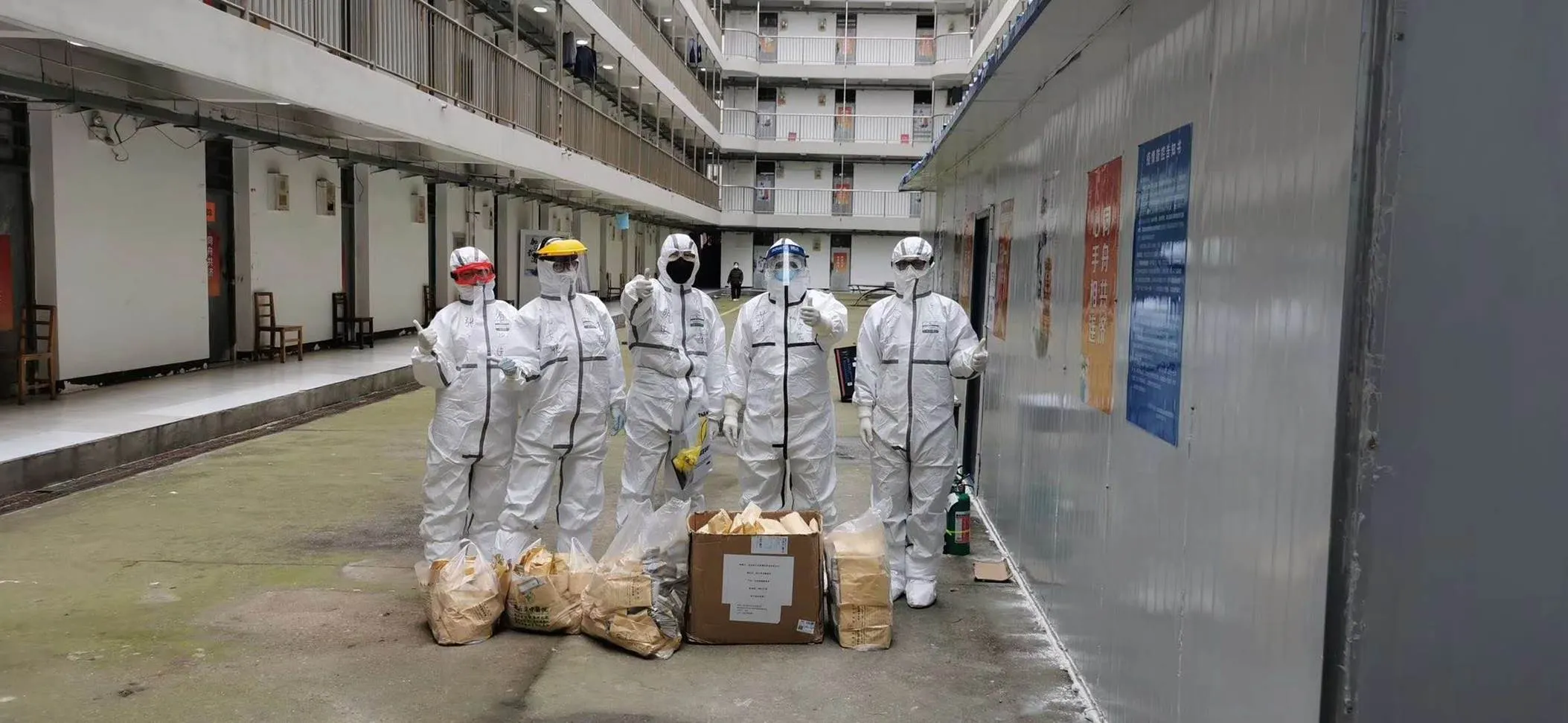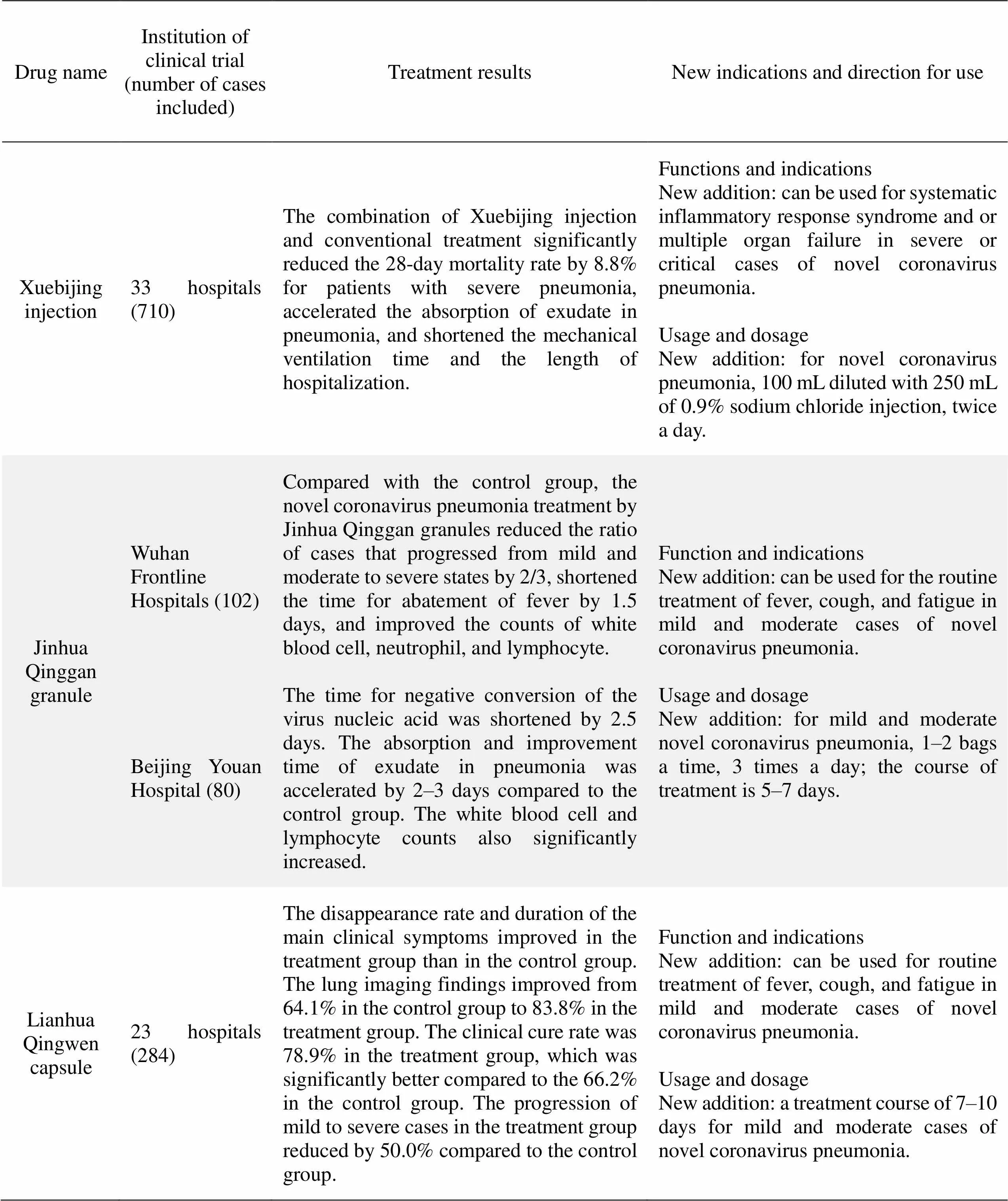Treating COVID-19 by traditional Chinese medicine: a charming strategy?
Yu-Liang Zhang, Wan-Ying Zhang, Xin-Zhe Zhao, Jia-Ming Xiong, Guo-Wei Zhang*
News
Treating COVID-19 by traditional Chinese medicine: a charming strategy?
Yu-Liang Zhang1, Wan-Ying Zhang1, Xin-Zhe Zhao1, Jia-Ming Xiong1, Guo-Wei Zhang1*
1College of Traditional Chinese Medicine, Baoding 071000, China.

Hubei Provincial Hospital of Traditional Chinese Medicine. Ming-Zhong Xiao
On April 14, 2020, the State Council of China announced that “three proprietary Chinese medicines and three decoctions” of effective traditional Chinese medicine (TCM) in the treatment of the novel coronavirus pneumonia have passed clinical practice screenings [1]. Some scholars believe that early TCM intervention of mild and moderate cases and recovery period may reduce the ratio of mild cases progressing into severe and critical cases. Some data have also suggested that the combination of TCM and Western medicine may reduce the mortality rate in severe and critical cases [2, 3].
The “three proprietary Chinese medicines” are Chinese patent drug Jinhua Qinggan granules (approval number of State Food and Drug Administration of China (SFDA) Z20160001), Lianhua Qingwen granules (SFDA approval number Z20100040), and Xuebijing injection (SFDA approval number Z20040033) [4]. In this regard, the National Medical Products Administration of China recently approved the inclusion of the treatment of the novel coronavirus pneumonia as a new indication of the “three proprietary Chinese medicines”, which have become the world’s first batch of drugs suitable for COVID-19 (Table 1) [5].
The “three decoctions” are empirical formula of Chinese medicine Qingfei Paidu decoction, Huashi Baidu decoction, and Xuanfei Baidu decoction (Table 2). Among them, Qingfei Paidu granules and Huashi Baidu granule have been recently approved for clinical trials [5].
Jinhua Qinggan granule is a proprietary Chinese medicine developed during the 2009 H1N1 influenza pandemic. Both Lianhua Qingwen capsule and Xuebijing injection were identified as proprietary Chinese medicines developed and listed during the SARS in 2003 [3–5]. At present, 22 TCM treatment programs have been registered for clinical trials.
However, because Lianhua Qingwen capsule contains, Qingfei Paidu decoction contains, and both of them contain aristolochic acid, which can cause kidney injury and liver cancer [6–7]. Xuanfei Baidu decoction and Qingfei Paidu decoction contain, which hascardiovascular toxicity and stimulative effect on central nervous system [8]. Qingfei Paidu decoction contains, which may cause kidney injury [9]. Perhaps it is the above toxicity of herb that prohibits the import or clinical application of these six decoctions in Sweden, Singapore, the United States, Canada and other countries [10].

Table 1 Treatment efficacy of the “three proprietary Chinese medicines” for novel coronavirus pneumonia, approved drug indications, and direction for use.
Data source: Press Conference of the State Council Information Office of China on March 23, 2020.

Table 2 The compositions of the “three decoctions” and their efficacy in the treatment of novel coronavirus pneumonia
Data source: Press Conference of the State Council Information Office of China on March 23, 2020.
1. China Internet Information Center [Internet]. The Joint Prevention and Control Mechanism of the State Council held a press conference on the progress of scientific research and development of drugs and vaccines for novel coronavirus pneumonia [cited 2020 May 3]. Available from: http://www.china.com.cn/zhibo/content_75927077.htm (Chinese)
2. Guo Y, Li N. Statistics and analysis of drug intervention clinical trials of COVID-19. Chin J Mod Appl Pharm 2020,37: 793–801. (Chinese)
3. Yang Q, Sun Q, Jiang B, et al. Retrospective clinical study on the treatment of COVID-19 patients with integrated traditional Chinese and Western medicine. Chin Tradit Herb Drugs 2020, 51: 2050–2054. (Chinese)
4. China Internet Information Center [Internet]. The State Council Information Office held a press conference on the important role of traditional Chinese medicine in the prevention and treatment of COVID-19 and effective drugs [cited 2020 May 3]. Available from: http://www.china.com.cn/zhibo/content_75844688.htm (Chinese)
5. Xinhuanet [Internet]. These decoctions of traditional Chinese medicine are effective in the treatment of novel coronary pneumonia, the “three medicines and three decoctions” propose anti-pandemic plans of traditional Chinese medicine [cited 2020 May 3]. Available from: http://www.xinhuanet.com/2020-03/18/c_1125729859.htm (Chinese)
6. Sato N, Takahashi D, Tsuchiya R, et al. Acute nephrotoxicity of aristolochic acids in mice. J Pharm Pharmacol 2004, 56: 221–229.
7. Ng AWT, Poon SL, Huang MN, et al. Aristolochic acids and their derivatives are widely implicated in liver cancers in Taiwan and throughout Asia. Sci Transl Med 2017, 9: eaan6446.
8. Soni MG, Carabin IG, Griffiths JC, et al. Safety of: lessons learned. Toxicol Lett 2004, 150: 97–110.
9. Wang CF, Cheng XD, Gu JF, et al. Research development of the chemical material basis ofand its toxicity. China J Chin Mater Med 2015, 40: 840–846. (Chinese)
10. [Internet]. Lianhua Qingwen puzzle! Zhong Nanshan insists that the new crown can be ruled, and Singapore authorities refute that Sweden explicitly prohibits imports [cited 2020 May 3]. https://mp.weixin.qq.com/s/q59ROq_BY8gV_lmnELz1zw (Chinese)
:
Yu-Liang Zhang, Wan-Ying Zhang, Xin-Zhe Zhao, et al. Treating COVID-19 by traditional Chinese medicine: a charming strategy? Traditional Medicine Research 2020, 5 (4): 178–181.
Guo-Wei Zhang developed the idea for the study, coordinated and directed the article; Yu-Liang Zhang collected most of the data, drafted the manucript; Wan-Ying Zhang, Xin-Zhe Zhao and Jia-Ming Xiong collected and analysed the data. All authors read and approved the final manuscript.
The authors declare that they have no conflict of interest.
Nuo-Xi Pi, Rui-Wang Zhao.
6 May 2020
15 May 2020
18May 2020
Guo-Wei Zhang. College of Traditional Chinese Medicine, Hebei University, No.342 Yuhua Road, Baoding 071000, China. E-mail: xxzgw@126.com.
10.12032/TMR20200515179
 Traditional Medicine Research2020年4期
Traditional Medicine Research2020年4期
- Traditional Medicine Research的其它文章
- Marine natural products with anti-inflammation effects
- Dissecting the underlying pharmaceutical mechanism of Danggui Buxue decoction acting on idiopathic pulmonary fibrosis with network pharmacology
- Acupuncture and/or moxibustion for the treatment of lumbar disc herniation: quality assessment of systematic reviews
- Can Yin-Chai-Xiao-Du decoction be useful of COVID-19? the mechanism research based on network pharmacology
- Efficacy of Xuebijing injection for the treatment of coronavirus disease 2019 via network pharmacology
- The selection rules of acupoints and meridians of traditional acupuncture for postoperative nausea and vomiting: a data mining-based literature study
